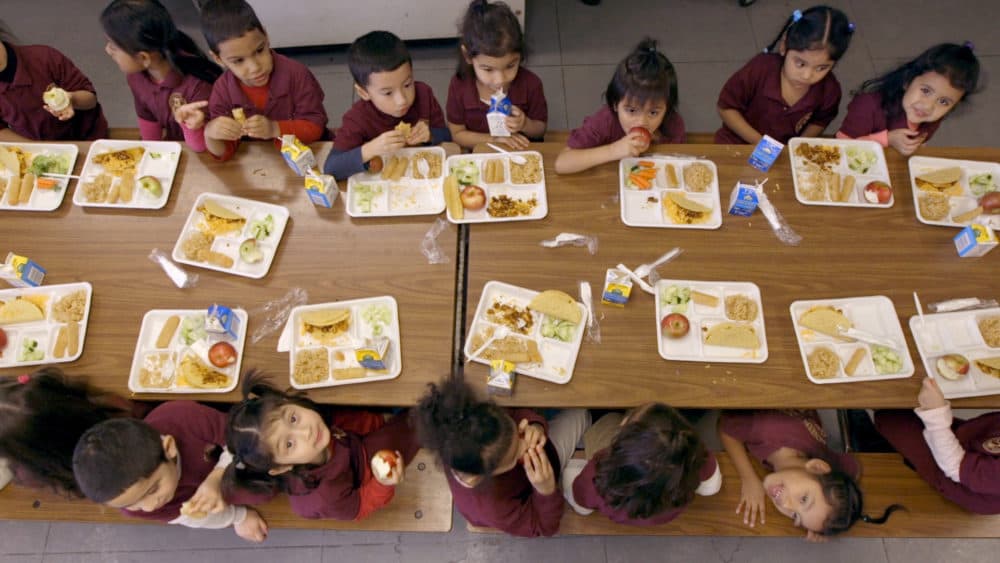Advertisement
'Eat Up': Bringing Kitchens Into Boston Public School Cafeterias
Resume
More than 20 million students across America rely on school lunches that are reduced cost or free.
Many of those lunches are trucked into the schools from corporate vendors. They fit the nutritional guidelines, but many kids say they don't look good or taste good.
A movement in Boston Public Schools is bringing schools back to the days when kids ate meals cooked in the school's own kitchen. Those lunches are healthy, they meet federal guidelines and don't cost any more than the trucked-in meals.
The program has drawn interest from other cities across the country, including Milwaukee and Washington, D.C.
Jennie Hall, the cafeteria manager at East Boston High School, says it was easier to run the school lunch program when workers just reheated prepackaged food. But she says it’s not about the job being easier.
“It's about seeing the kids enjoy what they're eating because when you have a packaged lunch, they're kind of telling you, 'This is what you have to eat,' ” she says. “So now they get to pick what they ... want instead of being told.”
And Hall says when they have healthy options, kids will choose them. She says her students eat at the two salad bars in the cafeteria.
Filmmaker Fiona Turner spent a year following how an entrenched Boston school system came to embrace a new way of serving kids healthy meals. The documentary she produced is called "Eat Up."
Turner says she’s convinced that education begins with food.
“Food is absolutely crucial to the well-being of every single child,” she says. “And when they're eating well, they're able to take instruction. There is much less disturbances and behavioral problems.”
Hall says cooking fresh food in the cafeteria was difficult at first, and some of her staff members quit. The advice she would give other school cafeteria workers who are reluctant to embrace the change is to stick with it.
“Hang in there. Get your staff together. Work together as a team. It's all for the children,” Hall says. “And that's who we're there for, for the children.”
Interview Highlights
On the importance of healthy school lunches
Turner: “We hear in the film from a nutritionist and he makes the point that the country is dependent on spending huge amounts of money to look at heart disease, diabetes, obesity and costing the nation billions of dollars a year. You can solve all of these issues if you solve the food we're feeding our kids.”
On what kind of food kids were served in Boston Public Schools
Turner: “The kids are being fed processed food that is packaged, frozen, shipped, delivered, reheated, served. When you've got a city that's spending $30 million a year on food for kids, and that's most of that is going in the [trash] bin. That's not sound sense. … It's all warmed in heating ovens. There's no smells and they can't really see what they're eating.”
Hall: “Well, back when I was a student, everything was baked. We had baked beans from scratch. We had hot dogs. If we had burgers, they were the real beef.”
On installing real kitchens in schools to serve healthier lunches
Turner: “Well, it turns out it's actually pretty simple. You need a kitchen where you're going to be cooking and serving. Boston is a particularly interesting example because it's got some of the oldest schools in the country and those old schools don't have kitchens. The area where they serve food is often in the hallways between classrooms. So she just figured, OK, we need kitchens, and then we can start looking at menus and revising what we actually put on the plate.”
Hall: “It looked complicated. And just sometimes change is hard. … At first it's hard because you never cooked in an oven before. But you need to just wait it out. The schools I've been to are doing marvelously.”
On the cost of installing kitchens in schools
Turner: “The Shah Family Foundation, whose initiative this was together with Boston Public Schools, figured out that you could actually put kitchens into schools without a lot of enormous finances. And once you've got, there's a particular kind of oven that's actually called a combination oven, and it heats and it steams and the food comes out super crispy.
“Yes, there's going to be an upfront cost. That's completely true. But the interesting thing about Boston Public Schools, what they have done in their system is that together with the Shah Family Foundation ... they recognized that actually once you have this oven, once you have the fridges instead of freezers, then you can actually cook within the amount of the federal reimbursement rate. So the federal government reimburses every child who is on the free school lunch program around $3.50, something like that, per meal. If you look at it creatively, there's a lot of things that you can do through those $3.50. So once you have the equipment, you could then provide the food within the government reimbursement level.”
Marcelle Hutchins produced and edited this interview for broadcast with Tinku Ray. Samantha Raphelson adapted it for the web.
This segment aired on November 22, 2019.

